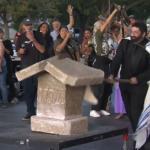(Originally posted September 18, 2009. This got lost in the migration from TypePad to WordPress, recovered and reposted for the archives here thanks to the Internet Archive Wayback Machine.)
Tribulation Force, pp. 91-95
We should take a moment here at the beginning of Chapter 5 to note something else we’re not seeing: chaos, anarchy, lawlessness and depravity.
The authors told us this was to be expected in the world of Tribulation Force — a world without any Real, True Christians. Those RTCs were whisked away, taking with them every vestige of salt and light, taking with them the very presence of the Holy Spirit indwelling them. The world has become something even worse than Sodom without five righteous men, it has become a world without the Spirit of God. (It’s a weirdly contra-biblical claim, but this seems to be LaHaye’s idea — that God is present in this world only to the extent that the Holy Spirit is present within RTCs. Take away those godly people and you take away every trace of God.)
The authors briefly hinted at what that ought to mean in the context of their story. In the early aftermath of the Event, they mentioned a crime wave. The Steele’s home was burglarized by Jimmy Bats and the beleaguered police told Rayford they were overwhelmed as this newly godless nation ran amok.
But then all of that just kind of stopped. No more crime or looting or savage attacks from roving bands of violent hoodlums unchecked by conscience or divine grace. Everything went back to normal.
Better than normal, really, considering how much work and disciplined cooperation must have gone into repairing all the damage from the Event — getting all of the infrastructure and machinery of daily life up and going again. It seems almost miraculous, really.
I’m fairly sure this wasn’t intentional — that the authors didn’t mean to present the world of Tribulation Force as the secular, post-RTC utopia it seems to be. I think they’re actually just lazy. Sustaining a premise takes thought, effort and attention, and those are all in short supply in this slap-dash first draft of a novel. Jerry Jenkins couldn’t be bothered to think about what the radically altered landscape of his story would entail, so he very quickly drifted back to default descriptions of a familiar world in which no airport, restaurant, suburban street or even local church appears affected by the removal of all of the world’s RTCs.
So I don’t think the astonishingly rapid return to normalcy post-Event was really something they thought about or that they meant anything by it. I think it’s just an accident of Very Bad Writing.
If we had the chance to sit down with the authors and ask them, I think they’d insist that a world without RTCs or the Holy Spirit would be utterly unlike the orderly, mundane place they’ve set forth in this book. I think they’d describe a depraved scene like something out of a Jack Chick tract, and I think they’d further explain that this is the sort of godless, lawless, bestial world they meant to convey in the pages of Tribulation Force.
Except they didn’t do that in their book. Here they presented instead a post-Event world that is indistinguishable from their version of the pre-Event world. The unintentional implication — found on every mundane page describing the characters’ unperturbed daily routines — is that the presence of a billion RTCs in this world really doesn’t make any difference one way or another.
This is a very strange message for these authors to be communicating, but it comes through loud and clear. As I said, I don’t think it’s an intentional message, but there it is.
A second unintentional message recurs throughout these books, something which also presents itself as Very Bad Writing, but in this case I think that’s the symptom, not the disease. I’m referring to the authors’ habit of reversing the usual shorthand signals most writers employ to prompt readers to like or dislike particular characters. Tim LaHaye and Jerry Jenkins frequently get these backwards without seeming to realize it.
In discussing some of the other flaws in these books we’ve noted instances where Bad Writing seems to emerge from the authors’ Bad Theology, or sometimes just from the authors themselves being Bad People. But I’m not talking about theology or morality here, I’m talking about likability — which is often related, but not the same thing.
What we have in these novels is a massive body of evidence that the authors simply don’t understand what makes most people like or dislike another person. Again and again we see Buck and Rayford behave in ways that range from the merely unappealing to the outright appalling, and in nearly every such instance the authors seem to have intended this behavior to persuade readers to be fond of these two jackasses.
I tried for a while to account for this bizarre characterization as some kind of attempt to present them as anti-heroes, or flawed heroes, or even just as rough-edged but lovable cads (like, say, Jimmy McNulty on The Wire). But such readings weren’t supportable or sustainable. That’s not what we have here.
What we have here is a compendium of reasons large and small for readers to detest Buck and Rayford, all set before us by wide-eyed authors who point to this very behavior and, grinning, say, “Aren’t they the coolest?”
No. No they’re not.
This gap is one of the main reasons these books are unreadable — the gap between how readers are forced to perceive the main characters and how the authors intended them to be perceived, or how the authors themselves perceive them. That chasm is so vast that one despairs of a common language.
We could go back to review prior examples of this — Buck’s juvenile misogyny toward Verna, Rayford’s pride in his off-putting obnoxiousness, both characters’ overweening sense of entitlement — but there are more than enough examples ahead of us. Such as here in the section of the book we’re considering today.
We left Buck in a limo headed toward cake or death, dimly fearing that the global despot and embodiment of evil he’s about to meet with might be planning something unkind:
Buck began to feel more confident that he wasn’t in mortal danger. Too many people had been involved in getting him from Chicago to New York and now to midtown. On the other hand, if Nicolae Carpathia could get away with murder in front of more than a dozen eyewitnesses, he could certainly eliminate one magazine writer.
Buck seems to have forgotten that Nicolae already has eliminated one magazine writer. Remember Eric Miller’s ferry ride? Buck’s worry that he might be in danger before his meeting with the Antichrist shows us that he doesn’t really understand what that meeting is about. This is the Find Out If Buck Knows Too Much meeting. You’re never in danger of being killed before such a meeting, but you won’t get out of it alive unless you’re able to convince the evil mastermind that you don’t Know Too Much, even if you actually do. That’s why it’s best to head into such a meeting with a plan that goes beyond simply recognizing, vaguely that one ought to have “some sort of plan … that sort of thing.”
The limo pulls up to “the exclusive Manhattan Yacht Club,” reimagined for the purposes of our story here as an ultra-swanky enclave for the mega-rich — a small piece of the Hamptons in downtown New York. The silent bodyguard from the limo leads Buck into the posh restaurant, “past a long line of patrons waiting for tables” directly to the maitre d’. More of the same business we saw at the airport, where Buck was allowed to board early and seated in Firster-than-First Class.
“Buck would have felt right at home in the Yacht Club,” we’re told, were it not for the presence of his hulking guide. Throughout this chapter, Jenkins takes pains to show us how relaxed and unperturbed by this setting Buck is. And we, the readers, are meant to be deeply impressed.
This is the sort of thing I was trying to describe above. Jenkins lays on the jet-set sophisticate details —
“How long will you be in town?” Buck asked, accepting a menu and allowing the waiter to drape a linen napkin on his lap.
What he’s shooting for, I think, is the effect of “Buck Williams is an impressive guy.” But he winds up, instead, with something more like “impressing others is important to Buck,” or, even worse, “Buck is terribly impressed with himself.” Throughout the restaurant interlude, Jenkins is desperately trying to get us to admire Buck, but it all produces the opposite reaction.
The effect is like being out to dinner with the sort of egomaniac who makes a big show of paying with his Black Platinum Elite card while complaining that the port is an inferior vintage (because, yeah, he ordered port), not as good as what he has at home and probably not even from the Douro Valley, where, by the way, he can recommend a splendid little restaurant. I have little personal experience with such appalling dinner companions, but I’m familiar with the scene from having watched it in dozens of movies and read about it in dozens of books. It’s a stock scene, meant to convey — often unsubtly — that we’re not supposed to like this show-off, that we should regard him as an unlikable jerk. While such stock scenes are a cliché, they work as a kind of short-hand vocabulary — they communicate what they are intended to communicate. Jenkins seems wholly unfamiliar with this established vocabulary, applying its terms here to Buck — portraying him as the ultimate Wrong Other Guy in a hackneyed rom-com — while expecting us to find Buck more likable because of it.
If your setting is an “exclusive” yacht club, a playground for wealthy elites, and you want your readers to like your hero, then you need to show that he or she doesn’t “feel right at home” in such a place. There are some exceptions, some few likable heroes who might feel right at home: Nick and Nora Charles, Tony Stark, James Bond, the gang from Leverage, I suppose (although their motive for being there — casing the joint — probably means they shouldn’t count).
There are probably other examples, too, but the list is short. Far, far shorter than the list of heroes who would find the club’s ostentatious indulgence and exclusiveness off-putting and unsettling. This is true for most heroes because it is true for most readers — for most humans.
I’ve had the misfortune on occasion to stumble into such settings myself and was always keenly aware that I was anything but “right at home.” Such places seem claustrophobic and a little mad, impossible quite to reconcile with everywhere else. You feel an urgent need for fresher air, for a lungful of perspective, maybe a whip of cords. You tug at your collar and finish your business so you can return to reality as quickly as possible.
This is almost always what a fictional protagonist is thinking too. When they seem too at ease in such settings they become suspect. When they boast of feeling right at home, they become odious. Despite their intentions, this is how the authors are instructing us here to respond to Buck.
What I’m trying to get at here isn’t economic — not class conflict, but rather the kind of moral intuition that precedes any such choosing of sides. One of my favorite essays, George Orwell’s “Charles Dickens,” describes this precisely in discussing Dickens’ “quasi-instinctive siding with the oppressed against the oppressors. As a matter of course he is on the side of the underdog, always and everywhere.”
More than any specific instance or even the accumulation of myriad such instances, it’s this choosing of sides that Jenkins always gets wrong. He, and therefore his characters Buck and Rayford, instinctively side with the oppressors against the oppressed, with the powerful against the powerless, with the exclusive against the excluded. The heroes’ religious conversions were just additional examples of this same choosing sides writ large.
That makes our heroes unlikable to begin with, but then Jenkins compounds the problem with the insulting assumption that readers must share this instinctive preference for the haves over the have-nots and for the most-exclusive, most-expensive privileges of the privileged. Here at the Manhattan Yacht Club, as in the previous chapter where Buck luxuriated in the jealous stares of the other airline passengers, it’s clear that Buck always feels right at home on the side of the overlords and not the underdogs. And because the overlords are so much more impressive, Jenkins assumes that we will therefore be impressed with Buck.
But as desperate as they are to be impressive, it’s just not possible for readers to be impressed with the toadying instincts of Buck and Rayford, Jenkins and LaHaye. The best one can do, instead, is to feel a measure of pity for four characters so earnestly desiring to be liked but so confused about what might make them likable — so intent on being admired, but so utterly clueless as to what is admirable.
















